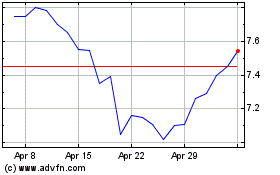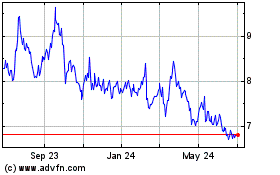GM Urged to Make Air Bags Standard in Mexico
December 27 2015 - 8:10PM
Dow Jones News
General Motors Co. is facing calls to add air bags as standard
equipment on its popular compact cars in Mexico, reflecting broader
pressure on big auto makers to include basic safety equipment in
their vehicles even when governments don't require it.
Four American consumer-advocacy groups, including Consumer
Reports and Public Citizen, have sent a letter to GM Chief
Executive Mary Barra calling on the company to make air bags a
standard feature globally. At least one of those groups said the
company hasn't responded.
"Auto safety cannot only be for citizens living in wealthy
countries," the U.S. consumer groups wrote in their letter to GM's
Ms. Barra. "Yet GM's practice of providing some consumers with the
best safety technologies, while not even providing air bags to
others, strikes us as a morally indefensible decision."
A GM spokesman said most auto makers offer some models without
air bags in Mexico and Latin America. The company is considering
adding air bags as standard equipment on certain models and option
packages, he said.
Light-vehicle sales in Mexico have increased 19% through
November, making it among the fastest-growing emerging markets for
autos. GM, which is No. 2 in sales there after Nissan Motor Co.,
sells that country's most popular passenger car, the Chevrolet
Aveo, but offers air bags only as an option, which many buyers
choose to go without.
Latin America's independent New Car Assessment Program recently
assigned the Aveo zero stars in a crash test, calling the vehicle
"unstable" with "a high risk of life threatening injuries."
Ms. Barra has been under pressure to clean up GM's safety image
after a crisis over faulty ignition switches linked to dozens of
deaths and injuries in the U.S. The crisis clouded the early days
of her tenure and cost the auto maker billions of dollars in
penalties and other damages.
Praised by the Justice Department and others for taking swift
action in the ignition-switch case, Ms. Barra has said the company
will use its focus on safety technology to race forward in
developing self-driving vehicles and gaining market share in
certain emerging markets where it is underrepresented. Adding air
bags as standard equipment in Mexico could be a relatively cheap
step in that direction.
Independent health and safety organizations put the cost of
adding a pair of air bags at between $100 and $150, and many auto
makers in other markets have found that car buyers, who have an
increasing choice of vehicles, generally welcome the devices. Like
Mexico, many Latin American nations don't perform their own crash
tests or have safety rules that mirror the standards in developed
markets such as the U.S.
GM's best-selling Aveo is the centerpiece of its lineup in
Mexico, with the Detroit auto maker selling over 66,000 of the cars
there this year. The Aveo accounts for about 40% of GM's Mexico
sales and 8.5% of the entire Mexican passenger-car market,
according to WardsAuto.com.
Pressure to make air bags standard isn't limited to GM or the
Mexican market. Many companies, including Nissan, have been
criticized for not offering air bags in India, where safety
regulations are lacking. But the biggest sellers in India, which is
about three times the size of the Mexico market, have begun adding
the devices in advance of stricter government standards being
phased in between 2017 and 2020.
In a recent interview, Ms. Barra said GM aims use safety
technology to set itself apart in India, where it currently is a
niche player.
The GM spokesman said the company is committing to invest $5
billion to develop a new car for emerging markets, including India
and Mexico, that has standard front and side air bags, but that car
isn't due until the 2019 model year.
While Latin NCAP Secretary General Alejandro Furas said
zero-star vehicle ratings are common in Latin America because of a
lack of government oversight, he singled out GM for delivering
consistently poor results since the group began testing cars in
2010.
"Chevrolet has consistently performed badly in our tests over
the last five years in high selling models," he said.
Latin NCAP, which tests the version of a car model with the most
basic safety equipment available, ranks GM below all other auto
makers on safety except for some Chinese brands.
GM installs air bags in every Aveo and other vehicles exported
to the U.S. and other markets that require them, according to
Stephan Brodziak, a vehicle-safety expert at Poder del Consumidor,
a consumer-advocacy group based in Mexico City.
About 80% of Mexican-made light vehicles are exported, mostly to
the U.S. Installing two air bags in a vehicle costs manufacturers
about $100, Mr. Brodziak said.
Mr. Furas said other manufacturers have added air bags as
standard equipment after failing Latin NCAP's crash test. He
pointed to Nissan, which stopped offering its Tiida and Sentra
sedans without air bags in Mexico after both models received zero
stars from the organization.
Dudley Althaus
(END) Dow Jones Newswires
December 27, 2015 19:55 ET (00:55 GMT)
Copyright (c) 2015 Dow Jones & Company, Inc.
Nissan Motor (PK) (USOTC:NSANY)
Historical Stock Chart
From Oct 2024 to Nov 2024

Nissan Motor (PK) (USOTC:NSANY)
Historical Stock Chart
From Nov 2023 to Nov 2024
